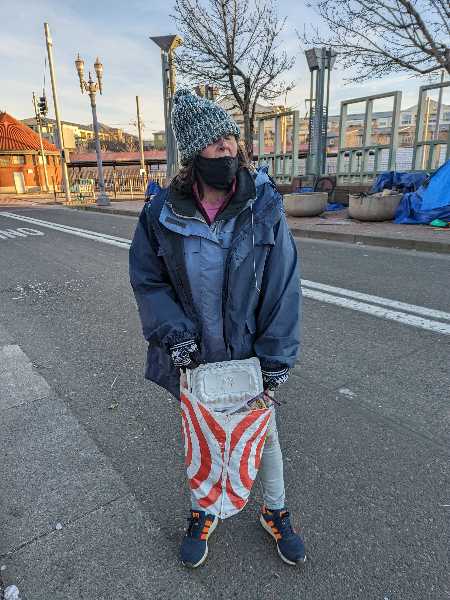PORTLAND, Ore. (PORTLAND TRIBUNE) — Gina Karpinsky was in the roadway cleaning up just before 8 a.m. Friday, Jan. 28, on the bus mall in Old Town. Her tent is on the sidewalk on the east side of the former Greyhound bus station. All sides of the old bus station have been dominated by campers for two years. The camp connects to the spillover scene at Bud Clark Commons, and the tiny home village next to that.
The TriMet bus stop is blocked by a tent, its bench gone and its timetable monitor broken. Pedestrians walk in the street more than the sidewalk. Wet clothes, broken camping gear and food are scattered all along the block.
On Friday as the sun was rising, another woman in bare feet, despite the 35-degree cold, walked from one tent to another to fill her mug. A man yelled about the steel firepit on the sidewalk, which had lost one of its legs, and was turned over, spilling the ashes of burned books.
Karpinsky was alone, filling a Target shopping bag with trash, ready to take it to the metal trash can on the corner.
“I’m just trying to help the streets look better, the area that we live in, be presentable, Karpinsky said. “And feel better about ourselves, to look out at a clean environment.”
Not too many people clean up the camp. “It doesn’t ring a bell in (their) head, that you want to keep it clean, so it looks good when people come through,” Karpinsky said.

Four years and four weeks
Karpinsky has been in this spot, where the buses and MAX trains turn, for four weeks. She has been homeless for four years.
“With identity theft I’ve had to move around a lot,” she said. Mostly, Karpinsky had been living in the Oaks Bottom Wildlife Refuge in Sellwood.
Asked how she survives, she said “It’s very, very hard. I never intended to be out on the streets. I’ve never been out in the streets.”
Portland Tribune and its parent, Pamplin Media Group, are KOIN 6 news partners.
Karpinsky told a complex story about PTSD, being shot and stabbed, raped and having her son killed. She said there was a “bad mafia cop” and federal agents looking for her. Karpinsky said she worked three jobs when she arrived in Portland, including a job in a factory that makes plastic crates.
“And then, every time it seems I get back in the loop, my Social Security number, bam! Hey, here we go again.”
She gets food with food stamps and by going to the Blanchet House nearby.
“I was in the process of getting a (free) phone, but it was a laptop that day. Then somebody asked me if I had one and I sold the laptop for 100 bucks. I needed money for personal items, you know?”
Blinded by wires
She spent the money at a dollar store to fix up her tent, and thieves stole those things too.
“This is a last deal right here. This is where God brought me after being gone, gone, gone. This is where I sit, waiting for the FBI marshals. So I am in here putting my faith in the Lord. I do not like it, because I’m a woman who’s always worked.”
Karpinsky is from Boston and could go see her dad’s sister’s kids, but has no plans to.
Camping has been hard. “I lost my eye, it’s been bothering me.” She said that was caused by “iron wires” in the park. “Living there and trying to survive and not be shot, I’ve been shot four times and stabbed once, it went in my eyes, the death wire, and wiped everything out. In this park that I was in.”
She has no heat in her tent.
“I have MRSA (methicillin-resistant staphylococcus aureus, a bacterial infection). It can kill you, and it’s up to the middle of my spine. It’s from trauma and cold, in your bones, from laying on cement,” Karpinsky said.
